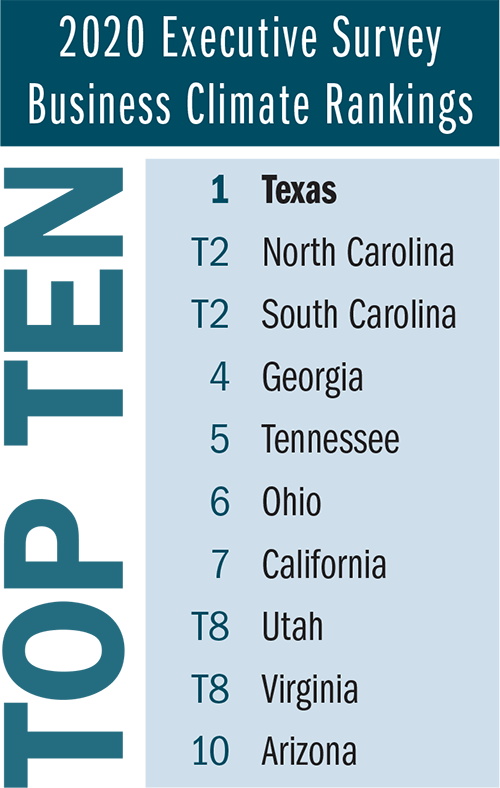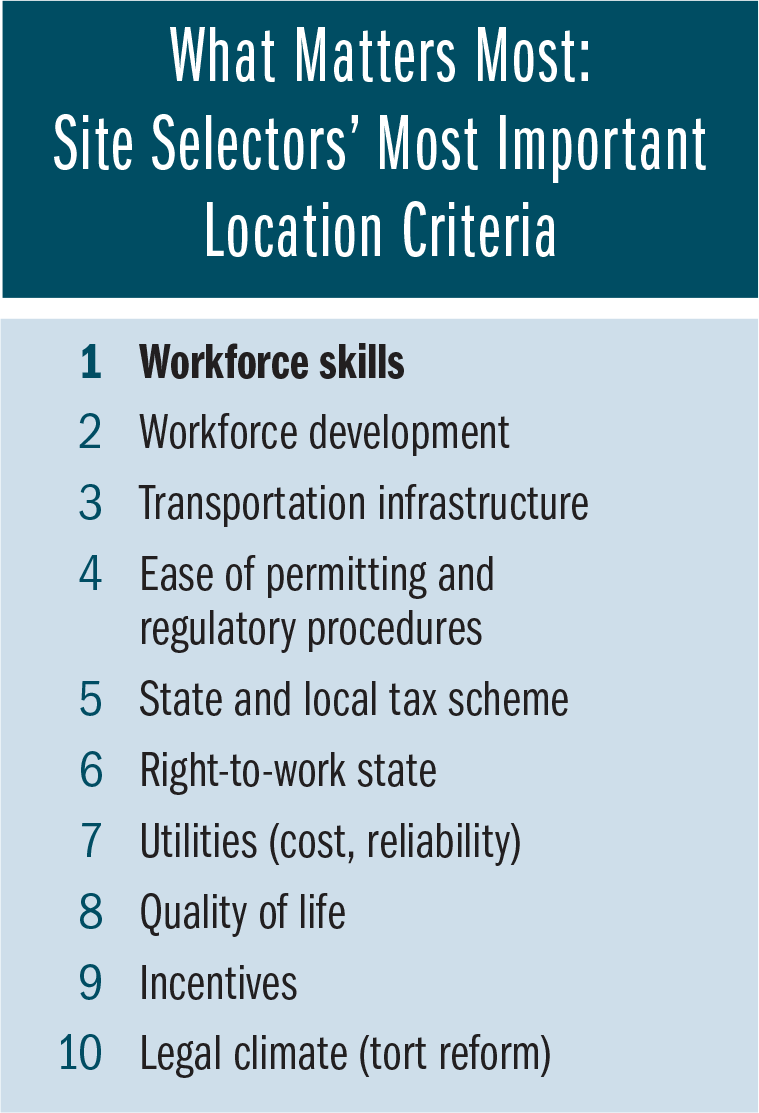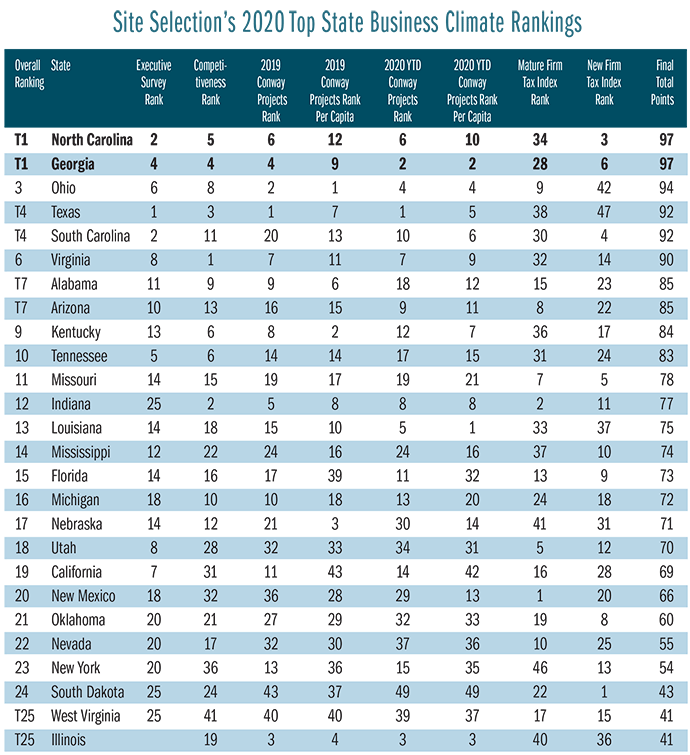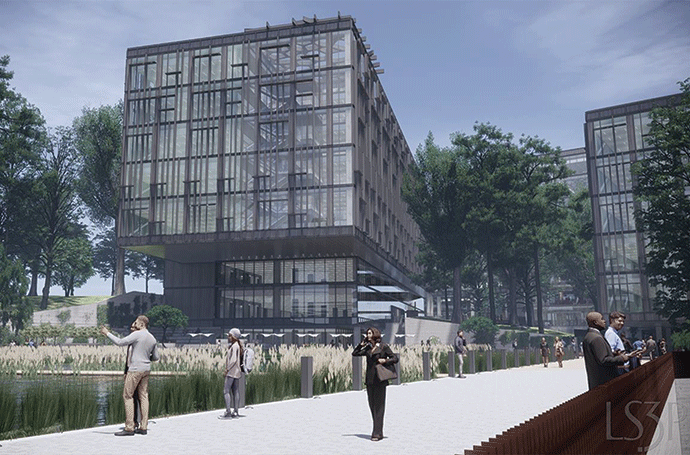State business climates are exceedingly competitive in 2020, if Site Selection’s latest Business Climate Ranking is any indication. For the first time ever, two states claim the top spot — Georgia, which now has an eight-year run in first place, and North Carolina, which missed tying Georgia last year by just two points. What’s more, there are two additional sets of tied states in the Top 10, Texas and South Carolina in fourth place and Alabama and Arizona in seventh.

Half the ranking is based on a survey of corporate executives and site selectors (asked to identify the states they believe to have the best business climate) and half on an index of project counts and other criteria as outlined in the methodology on page 80. Even in the executive survey, where Texas ranks first, there are two sets of tying states — North and South Carolina in second place and Utah and Virginia in eighth.

Following are select responses to a survey question asking which factors played into participants’ choice of top state business climates:
- Good tax climate, great talent development programs, population growth and competitive incentives
- Labor, connectivity, access to markets, cost of doing business, business-friendly environment
- Workforce development and job training support, state incentive policies
- Access to labor skills, cost of doing business, and state/local economic development infrastructure
- Business cost factors such as taxes and regulatory environment
- Labor skills, transportation network, taxes, growth, labor-management relations
- Ease of doing business, variable operating costs, taxes and incentives
- Overall site quality, workforce development programming, professional economic development platform, incentives that work
- Accommodating policies, low tax structure, ample talent

Site Selection also asked survey respondents whether states’ handling of the COVID-19 pandemic factored into their choices. Here’s what four had to say:
- Yes and no: Ohio, Texas and Arizona were a yes; California, Illinois and New York a no.
- Yes, but it was sometimes positive and sometimes negative.
- No, my clients make site selection decisions based on long-term factors. COVID-19 is expected to have a relatively short-term impact, and any relief/incentives/programs related to COVID-19 from state and local governments are also expected to be short-term.
- Yes, in terms of their ability to minimize risk of recurring lockdowns or economic shutdowns due to the statewide response.
Georgia’s Commissioner of Economic Development Pat Wilson returned recently from a business recruitment trip to Germany and Italy that resulted in Peach State projects worth more than $200 million. They’re just the latest in a long list of 2020 capex wins for the state.

“We’re not doing anything differently,” Wilson tells Site Selection. “It’s more about a track record of doing things the right way in Georgia. If you’re a company looking to grow and prosper in Georgia, you know you’ll get the support you need from the state and from the local economic developers, because the state has done it well for so long. We continue that momentum based on years of investment in infrastructure, work force and the business climate that makes companies successful.”
“My clients make site selection decisions based on long-term factors. COVID-19 is expected to have a relatively short-term impact.”
What are business leaders telling Wilson are their most pressing needs? They haven’t shifted much in recent years, he notes. “Number one is a long-term work force and whether the state will assist in making sure companies have the people they need to be successful. That’s something Georgia has done better than anywhere else — working with companies to producing the people they need in the positions they have.”
Even in a time of business uncertainty brought on by the pandemic, Georgia has continued to see what Wilson calls “a run of companies choosing to invest and do business in Georgia — so much so that in the past three months we are on a record pace for jobs and investment in the state.”
Recent Georgia Projects
BandD Foods, a supplier of steak, beef, pork and chicken products, will invest $15 million in opening a food processing and packaging facility in Sumter County, bringing more than 100 jobs to Americus. This facility will serve as the company’s eastern U.S. headquarters and marks the company’s first location outside of Idaho.
La Regina Atlantica, a U.S. subsidiary of Italian producer of homemade pasta sauces La Regina di San Marzano, will invest $20 million in a new food processing facility in Bacon County, delivering 250 jobs to Alma, Georgia. La Regina Atlantica will source carrots, peppers, basil, onions and meats from farmers locally. The company’s freshly grown tomatoes will be imported from Italy through the Port of Savannah, where they will then be transported to Alma to be processed into the brand’s world-famous sauces.
Kysor Warren Epta US, a subsidiary of Epta and leading provider of commercial refrigeration products, will invest more than $27 million in expanding its operations in Columbus, delivering 200 jobs to the local community.
Fortune 1000 company Deluxe will establish a new office complex along with a FinTech and Customer Innovation Center in the City of Sandy Springs in Fulton County. Deluxe will create 709 new jobs and invest more than $10 million in the metro Atlanta project.
Frito-Lay, a division of PepsiCo and a leading snack manufacturer, will expand its operations in the City of Perry, town of Kathleen, creating 120 new jobs and investing $200 million in the Houston County project.
On October 1, Governor Brian P. Kemp, in conjunction with the Georgia Department of Economic Development, announced that more than 10,000 jobs were created across all regions of the state by economic development projects in Georgia during the first quarter of fiscal year 2021, generating more than $3.71 billion in new investments. This represents a 50% increase in new jobs created and an 85% increase in new investments compared to the same quarter in the previous fiscal year. Industries that created the most jobs during the first quarter of the new fiscal year include food processing, manufacturing, and logistics and distribution.
Ranking Methodology
Fifty percent of the overall Business Climate Ranking is based on a survey of corporate site selectors who are asked to rank the states based on their recent experience of locating facilities in them. The other 50% is based on an index of seven criteria: performance in Site Selection’s annual Prosperity Cup ranking (formerly the Competitiveness Award); total Conway Projects Database-compliant facility locations and expansion projects in 2019; total projects in 2019 per capita; total 2020 projects year to date; total 2020 projects year to date per capita; corporate and property tax data from the Tax Foundation’s State Business Tax Index.
In spite of the pandemic, jobs and investment numbers in Georgia have increased when compared to the same time period last year. Between March 1 and September 30, 2020, the Global Commerce division of the Georgia Department of Economic Development assisted in locating 176 new economic development projects, creating 19,345 jobs and $6.48 billion in investment.
“Georgia in uncertain times continues to be a certain bet,” says Wilson. “When companies are looking for something that they know will be there in the long run, Georgia is where they are turning.”
The Commissioner says his role is to keep the momentum going. “This started years ago,” he relates. “We have had three very pro-business governors that have given us what we need to do our jobs. When times are down and the world is uncertain, companies turn to Georgia for that bit of certainty. That says a lot about the people of Georgia and the leaders of the state, that companies come here so they can be successful.”

Much of Georgia’s economic success in 2020 can be found in rural parts of the state, which is a win for Governor Kemp, who is actively promoting rural Georgia with a strike force to get resources and deal-making expertise to areas outside metros like Atlanta in need of them. On October 21, Governor Kemp named Tift County Development Authority President and CEO Brian Marlowe as the new Deputy Commissioner for Rural Georgia. Tift County is in rural south central Georgia.

But Atlanta is still a Southeast magnet for investment. In September, Papa John’s announced it has selected metro Atlanta to open a new global headquarters in 2021, delivering 200 jobs to the area. “It’s a pleasure to welcome Papa John’s to the strong list of internationally known U.S. companies that have chosen the Peach State for their global headquarters,” said Governor Kemp. “As the Top State for Business for seven consecutive years, these leading businesses know that Georgia has what they need to continue to thrive and expand. I’m confident that Papa John’s will continue finding success in Georgia, and I look forward to seeing the exceptional opportunities this brings to hardworking Georgians across metro Atlanta.” Papa John’s currently employs 2,500 Georgians.
A Tar Heel Comeback
This is hardly North Carolina’s first time at the top of Site Selection’s Business Climate Ranking. It had a six-year run of first-place finishes from 2005 through 2010. And it has been a formidable competitor ever since, very nearly tying Georgia in 2019.
A program developed in recent years, largely to lure Apple to the state, is proving to be an effective business climate enhancer still, says Chris Chung, CEO of the Economic Development Partnership of North Carolina, the state’s chief business recruitment agency.
Recent North Carolina Projects
Nestlé Purina PetCare Company plans to establish significant new manufacturing and distribution operations in Rockingham County that will become operational in 2022 and create up to 300 new jobs by 2024. The company will invest $450 million in a 1,300-acre site near Eden that formerly housed MillerCoors brewery, where it will manufacture and distribute Purina pet food.
Pratt & Whitney, a division of Raytheon Technologies Corp. plans to invest approximately $650 million through 2027 in a new Buncombe County manufacturing facility. At full buildout — 1 million sq. ft. — the operations of Pratt & Whitney are intended to create over 800 jobs at average wage of $68,000, approximately 60% above the average wage in Buncombe County. The project is expected to generate over $54 million in new annual labor income for Buncombe County and the Asheville Metro Region, according to estimates by the Department of Commerce.
UPS will undertake a significant expansion to its North Carolina presence with the addition of 592 jobs in Guilford and Alamance counties. The company plans to invest a total of $316.4 million at two sites over the coming four years.
Cambridge, Massachusetts-based Beam Therapeutics, a biotechnology company developing precision medicines through DNA base editing, plans to build a manufacturing facility in North Carolina’s Research Triangle Park, creating 201 jobs. Over a period of 5 years, the company expects to invest $83 million in the facility, which will support clinical and commercial manufacturing for the company’s novel base editing programs.
Retirement Clearinghouse, LLC (RCH), a leading national name in retirement plan services, will create 300 new jobs in Mecklenburg County. The company will invest more than $4.1 million to expand their headquarters and corporate office in Charlotte.
“It made a high-octane version of our withholdings tax rebate program for large investment and job creation scenarios,” he explains. “Even though it wasn’t used these past two years, it was deployed this year for the Centene East Coast campus, which is the biggest win and I believe state incentive package ever for North Carolina.”
On July 1, St. Louis-based Centene Corporation, a Fortune 50 provider of managed care services for public and private health plans, announced it will create an East Coast regional headquarters and technology hub in Charlotte. This move will bring 3,237 new jobs to North Carolina and an investment of more than $1 billion by 2032. Centene’s 3,237-job commitment makes the company’s new Charlotte area campus the largest job creation project in the 18-year history of the state’s Job Development Investment Grant (JDIG) program.

The new Centene hub will employ allied health professionals, data analysts, information-technology specialists, administrators and others. Meanwhile, the company will retain its current workforce of nearly 600 in North Carolina. Centene’s new positions will offer salaries that average $100,089 annually, creating a regional payroll impact of nearly $324 million per year. Mecklenburg County’s overall average annual wage is currently $68,070.
“We chose Charlotte as the home to our East Coast headquarters because we believe it will enable us to continue our strong growth and our mission to serve the most vulnerable populations,” said Michael F. Neidorff, chairman, president and CEO at a press conference announcing the investment. “We look forward to our future in Charlotte and intend to be a strong part of the community, as we are in all of the places where we have business operations.” Neidorff also said the Charlotte hub could grow to 6,000 employees in the coming years.
Centene’s project in North Carolina will be supported in part by a “transformative” classification Job Development Investment Grant (JDIG), the first JDIG of this type ever awarded. The project is estimated to grow the state’s economy by $29.5 billion over 39 years, the time period the grant could be active. Using a formula that considers tax revenues generated by the 3,237 new jobs, the JDIG agreement authorizes the potential reimbursement to the company of up to $387,890,250. This potential payment would be spread over 39 years.
Centene’s 3,237-job commitment makes the company’s new Charlotte-area campus the largest job creation project in the 18-year history of the state’s Job Development Investment Grant (JDIG) program.
The North Carolina General Assembly introduced the project classification to the JDIG program in 2017. Projects from companies that invest more than $1 billion and create more than 3,000 jobs can qualify for the special grant classification, which alters certain program parameters such as the length of time the grant can be active and the percentage of state tax withholdings that can be used to fund the grant.
“We were able to do more than we normally could because of that provision that was tacked onto the program in 2018,” says Chung. “In the past seven months, some tools have been set up specifically to help companies navigate the pandemic and the challenging economic circumstances. These include a recovery loan program, a retention grant program that was enacted a couple of months ago. These are additions to the toolbox that are designed to respond to the existing employers that have had to weather these unprecedented circumstances. Projects like Centene are a wonderful recruitment success, because we know it’s not easy to win those. But we never want to forget about the companies that are already here.”

North Carolina Secretary of Commerce Anthony Copeland says his state’s business climate success goes back decades to investments that even in the 1980s set it apart from other Southeast states. “Investments in education, infrastructure, the Research Triangle Park all set the stage for where we are today,” he says. “We’re reaping the benefits of much of that today. My job here is to continue that.”

Reflecting on nearly four years of Gov. Roy Cooper’s time in office, Copeland recalls the bruising the state incurred following passage of HB 2, the so-called Bathroom Bill, that threatened to jeopardize North Carolina’s business climate. “We had companies that wouldn’t even look at us. One of my directives from the governor was to work with the legislature to repeal HB 2 and put stability back into economic development. We returned North Carolina to a state of stability and predictability.”
Passage of the JDIG variant for large investments was another catalyst for attracting Centene-sized projects. “That and the fact that they were comfortable knowing they could find 6,000 employees in the Charlotte metropolitan area,” says Copeland. “JDIG has been around since 2003, but it has remained a predictable and effective mechanism. Businesses want predictability.”

